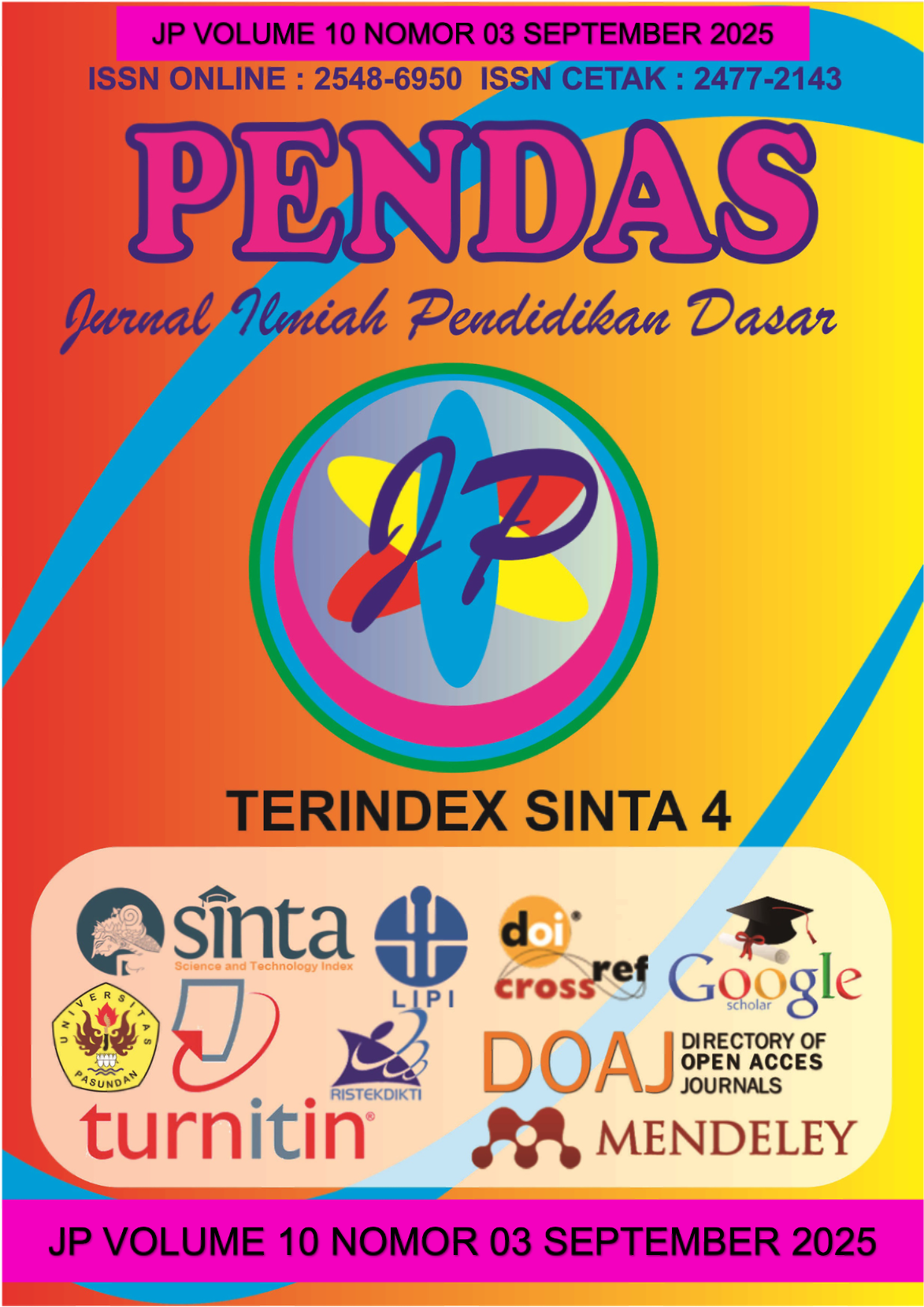ANALISIS HAMBATAN KOGNITIF SISWA KELAS 2 SD DALAM MENGINTERNALISASI KONSEP PERKALIAN SEBAGAI PENJUMLAHAN BERULANG DI SDIT GLOBAL INSANI ISLAMIC SCHOOL
DOI:
https://doi.org/10.23969/jp.v10i03.31738Keywords:
cognitive obstacles, multiplication, repeated addition, elementary studentsAbstract
This study aims to analyze the forms of cognitive obstacles experienced by second-grade elementary school students in internalizing the concept of multiplication as repeated addition. The background of this research is rooted in the phenomenon of students’ weak understanding of basic multiplication concepts, which ideally should be constructed through concrete and contextual approaches as mandated in the national primary education curriculum. The research was conducted at SDIT Global Insani Islamic School in Bekasi City using a descriptive qualitative method with a case study approach. The subjects involved classroom teachers and students who demonstrated difficulties in understanding the concept of multiplication. Data collection techniques included direct observation, in-depth interviews, documentation, and field notes, all of which were analyzed inductively with source and technique triangulation to ensure validity. The findings revealed four primary categories of cognitive obstacles: (1) conceptual misunderstanding—students did not fully grasp multiplication as repeated addition; (2) reasoning errors—students showed difficulty distinguishing between types of mathematical operations; (3) limited cognitive strategies—students relied heavily on concrete strategies such as counting with fingers or using real objects, without progressing to symbolic abstraction; and (4) negative mental attitudes—such as anxiety, low self-confidence, and reluctance to ask questions, which hindered learning. Additionally, external factors such as an unconducive learning environment, unvaried instructional approaches, and individual student differences contributed to the persistence of these difficulties. This study recommends the implementation of contextual, student-centered learning strategies to support more effective and meaningful mathematical concept internalization.
Downloads
References
Surya, E., & Putri, F. (2021). Pemahaman Konsep Matematika dalam Pembelajaran Abad 21. Jurnal Pendidikan Matematika.
Irawati, R. (2020). Miskonsepsi Siswa pada Operasi Perkalian. Jurnal Pendidikan Dasar.
Yasir, A. (2024). Analisis Faktor Lingkungan terhadap Proses Pembelajaran Matematika. Jurnal Pendidikan Indonesia.
Mustika, A. (2023). Kesalahan Penalaran Matematika pada Siswa Sekolah Dasar. Jurnal Pendidikan Matematika Dasar.
Andriani, M. (2022). Pengaruh Strategi Kognitif terhadap Hasil Belajar Matematika. Jurnal Psikologi Pendidikan.
Yasir, A. (2024). Pengaruh Media Interaktif dalam Pembelajaran Perkalian. Jurnal Teknologi Pendidikan.
Santoso, D., & Dewi, R. (2021). Pengaruh Kecemasan Matematika terhadap Kemampuan Pemecahan Masalah. Jurnal Pendidikan Dasar Indonesia.
Suryana, E. (2022). Efektivitas Strategi Pembelajaran Kontekstual dan Permainan dalam Penguasaan Perkalian. Jurnal Ilmu Pendidikan Dasar.
Damayanti, N. (2023). Pembelajaran Berdiferensiasi dalam Matematika Sekolah Dasar. Jurnal Pendidikan dan Psikologi Anak.
Yasir, A. (2024). Pengaruh Lingkungan Belajar terhadap Pencapaian Konsep Matematika Siswa SD. Jurnal Inovasi Pendidikan Dasar.
Rohimah, S. M., & Anaya, S. N. (2024). Learning obstacles analysis on multiplication of natural numbers in elementary school. Kalamatika: Jurnal Pendidikan Matematika, 9(2).
Muthma'innah, M. (2023). Difficulty learning mathematics material for multiplication counting operations in elementary school. Rangkiang Mathematics Journal.
Downloads
Published
Issue
Section
License
Copyright (c) 2025 Pendas : Jurnal Ilmiah Pendidikan Dasar

This work is licensed under a Creative Commons Attribution 4.0 International License.



















